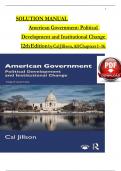Exam (elaborations)
Instructor s manual for american government political development and institutional change 12th Edition by Cal Jillson.pdf
Course
Political development and institution change
Institution
Political Development And Institution Change
Instructor s manual for american government political development and institutional change 12th Edition by Cal JInstructor s manual for american government political development and institutional change 12th Edition by Cal JInstructor s manual for american government political development and insti...
[Show more]
Preview 4 out of 34 pages
Uploaded on
September 27, 2024
Number of pages
34
Written in
2024/2025
Type
Exam (elaborations)
Contains
Questions & answers
12th edition instructor s manual for american government politi
american government political development and inst
by cal jillsonpdfinstructor s manual for american
Institution
Political development and institution change
Course
Political development and institution change
$18.99
100% satisfaction guarantee
Immediately available after payment
Both online and in PDF
No strings attached
1




